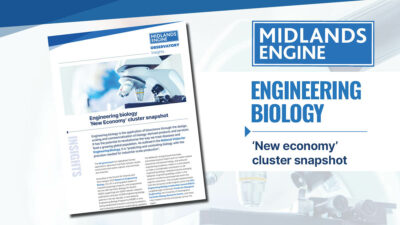
Transport
Apr 25 2024
Birmingham Airport (BHX) has achieved Level 3 (optimisation) of the Airport Carbon Accreditation (ACA) scheme for a second year.
Read more
A new Midlands Engine cluster snapshot report finds our region’s strong biosciences base, encompassing both health and non-health related bioscience and biotechnology, and profound engineering excellence, means it is well-placed to make a considerable contribution to UK engineering biology.
Engineering biology is the predicting and controlling of biology with the precision needed for industrial-scale production.
Underpinning the emerging Midlands’ engineering biology cluster is the research excellence and expertise within the region’s universities. This includes representation from the University of Birmingham within the UK’s Engineering Biology Leadership Council (EBLC), Loughborough University’s Centre for Biological Engineering, the University of Nottingham’s Synthetic Biology Research Centre, and many more research centres and groups across the region.
The snapshot looks at the cluster through four lenses:
The report finds that there are 200 businesses based in the Midlands, representing over 10% of the UK total.
This has grown year on year, with the number of AI companies in our region growing by 96% between 2013 and 2022.
Universities in the Midlands are central to fostering innovation in engineering biology. The snapshot showcases many of the innovation assets across the Midlands, including Nottingham’s BioCity, the University of Birmingham’s Health innovation campus and the Centre for Biological engineering in Loughborough University.
The projects these assets are working on are also considered. The University of Leicester, for instance, is using engineering biology to find how cells identify and split which will have practical implications for understanding various biological processes and disease.
Elsewhere, research at the University of Warwick’s High-Field Solid-state facility will make possible experiments that provide unique information for applications across science.
The snapshot also illustrates where these 5,166 employees working in engineering biology companies are based across the Midlands.
High density populations include Charnwood with over 750 employees (thanks to Loughborough’s Centre for Biological Engineering) and Harborough in Leicestershire. Birmingham and Nottingham also have notable concentrations of employees.
Over £450m worth of investment funding identified within engineering biology companies registered or active in the Midlands since 20098. Companies who received investment include: Deep Branch Biotechnology Ltd; Phenotypeca Limited (Nottingham); NanoSyrinx (Coventry); MirZyme and PBD Biotech (Birmingham)
This report is the latest from the Midlands Engine in our series of snapshots looking at the ‘5 Critical technologies’ identified by the government.
You can find the others via our Resource Library here:

Transport
Apr 25 2024
Birmingham Airport (BHX) has achieved Level 3 (optimisation) of the Airport Carbon Accreditation (ACA) scheme for a second year.
Read more
Global
Apr 24 2024
World-leading materials science and technology consultancy Lucideon is targeting international growth with expansion in the Japanese market.
Read more
Global
Apr 18 2024
The Midlands Engine Partnership will host a Pavilion for the very first time at this year’s UK Real Estate Infrastructure Investment Forum [21-23 May], providing regional partners with a platform to showcase their investment propositions, worth in excess of £42bn, to a global audience.
Read more